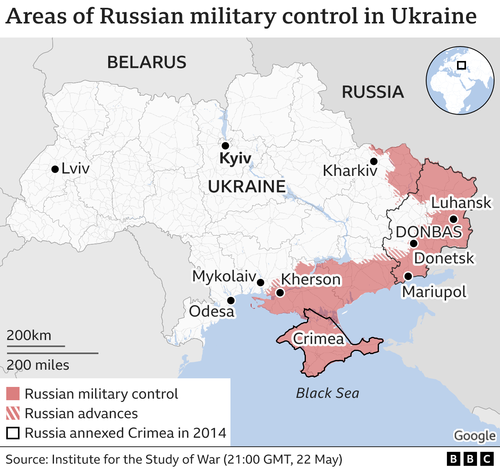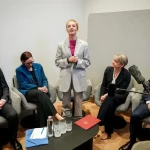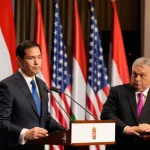
It's clear things are escalating fast over Ukraine when Western powers start rolling out phrases like "coalition of the willing" à la Iraq war speeches circa 2003. And now this from The Guardian:
Britain has backed in principle a proposal by Lithuania for a naval coalition "of the willing" to lift the Russian Black Sea blockade on Ukrainian grain exports.
The Lithuanian foreign minister, Gabrielius Landsbergis, proposed the plan during talks with the UK foreign secretary, Liz Truss, on Monday in London.
A great meeting with a true friend Liz Truss. Full agreement on the need to help Ukraine to achieve a complete victory. Covered the food crisis caused by Russian blockade of Odessa and the need to boost the security of NATO’s Eastern flank, incl forward defence in the Baltics. pic.twitter.com/zSLcB89r7i
— Gabrielius Landsbergis (@GLandsbergis) May 23, 2022
This as global and economic leaders gathered at Davos' World Economic Forum have been warning of a looming food catastrophe potentially impacting billions of people, especially in the Middle East and North Africa.
Describing ominously that time is running out, the top Lithuanian diplomat informed his UK counterpart that "It is not possible to store this grain, and there is no other adequate alternative. It is extremely important to show vulnerable countries that we are ready to take the necessary measures to feed the world."
Landsbergis' plan is to establish a multi-national naval escort, however not directly under the aegis of NATO (he assures), in order to protect grain ships traversing the Black Sea under watch of Russian warships. He specifically named Egypt as an example of a non-NATO country that could step up and provide protection, given it's already been perhaps hardest hit by the wheat shortage.
It should be noted that what he's not addressing is the extreme danger posed by Ukraine-placed mines outside Ukrainian harbors - something which Moscow has charged Kiev forces with as a deliberate provocation aimed at placing blame for blocked ports squarely on Russia.
UK Foreign Secretary Liz Truss is broadly backing Lithuanian plan for a naval escort to take grain convoys out from the port of Odessa. Pitfalls - Mines in harbour. Need for stronger artillery in Odessa and as yet absent support from Turkey, guardians of entry to Back Sea.
— Patrick Wintour (@patrickwintour) May 23, 2022
In explaining details of the plan, and attempting to stress it would carefully avoid provoking direct military confrontation with the Russian navy, Landsbergis described, "This would be a non-military humanitarian mission and is not comparable with a no-fly zone." But he then followed with: "In this endeavor military ships or planes or both would be used to ensure that the grain supplies can leave Odesa safely and reach the Bosphorus without Russian interference. We would need a coalition of the willing – countries with significant naval power to protect the shipping lanes, and countries that are affected by this."
Such a scenario would of course depend on Turkey's approval as well, given it controls passage through the Bosphorus according to the Montreux Convention.
But likely Russia would rally Turkey toward blocking approval (parallel to the current Finland, Sweden NATO ascension controversy) of the plan which would require opening the straits to foreign military vessels given the Kremlin certainly wouldn't see it as "non-military" in nature. After all, Landsbergis said he and Truss are in "Full agreement on the need to help Ukraine to achieve a complete victory."

In response to the Monday talks with the Lithuanian FM, Truss said: "What we need to do is deal with this global food security issue and the UK is working on an urgent solution to get the grain out of Ukraine."
According to the latest from the UK Times, London remains open to the plan and is in discussion with allies for establishing the "protective corridor" from Odesa through the Bosphorus, but has stopped short of approving that it should move forward at this early phase. It seems that the 'invitation' has gone out to allies, however, and the two leaders are actively floating the idea - perhaps also waiting for Washington's backing.
Meanwhile...
RUSSIA'S DEFENCE MINISTRY SAYS HAS COMPLETED DEMINING OF MARIUPOL PORT - IFX
— First Squawk (@FirstSquawk) May 24, 2022
It’s clear things are escalating fast over Ukraine when Western powers start rolling out phrases like “coalition of the willing” à la Iraq war speeches circa 2003. And now this from The Guardian:
Britain has backed in principle a proposal by Lithuania for a naval coalition “of the willing” to lift the Russian Black Sea blockade on Ukrainian grain exports.
The Lithuanian foreign minister, Gabrielius Landsbergis, proposed the plan during talks with the UK foreign secretary, Liz Truss, on Monday in London.
A great meeting with a true friend Liz Truss. Full agreement on the need to help Ukraine to achieve a complete victory. Covered the food crisis caused by Russian blockade of Odessa and the need to boost the security of NATO’s Eastern flank, incl forward defence in the Baltics. pic.twitter.com/zSLcB89r7i
— Gabrielius Landsbergis (@GLandsbergis) May 23, 2022
This as global and economic leaders gathered at Davos’ World Economic Forum have been warning of a looming food catastrophe potentially impacting billions of people, especially in the Middle East and North Africa.
Describing ominously that time is running out, the top Lithuanian diplomat informed his UK counterpart that “It is not possible to store this grain, and there is no other adequate alternative. It is extremely important to show vulnerable countries that we are ready to take the necessary measures to feed the world.”
Landsbergis’ plan is to establish a multi-national naval escort, however not directly under the aegis of NATO (he assures), in order to protect grain ships traversing the Black Sea under watch of Russian warships. He specifically named Egypt as an example of a non-NATO country that could step up and provide protection, given it’s already been perhaps hardest hit by the wheat shortage.
It should be noted that what he’s not addressing is the extreme danger posed by Ukraine-placed mines outside Ukrainian harbors – something which Moscow has charged Kiev forces with as a deliberate provocation aimed at placing blame for blocked ports squarely on Russia.
UK Foreign Secretary Liz Truss is broadly backing Lithuanian plan for a naval escort to take grain convoys out from the port of Odessa. Pitfalls – Mines in harbour. Need for stronger artillery in Odessa and as yet absent support from Turkey, guardians of entry to Back Sea.
— Patrick Wintour (@patrickwintour) May 23, 2022
In explaining details of the plan, and attempting to stress it would carefully avoid provoking direct military confrontation with the Russian navy, Landsbergis described, “This would be a non-military humanitarian mission and is not comparable with a no-fly zone.” But he then followed with: “In this endeavor military ships or planes or both would be used to ensure that the grain supplies can leave Odesa safely and reach the Bosphorus without Russian interference. We would need a coalition of the willing – countries with significant naval power to protect the shipping lanes, and countries that are affected by this.”
Such a scenario would of course depend on Turkey’s approval as well, given it controls passage through the Bosphorus according to the Montreux Convention.
But likely Russia would rally Turkey toward blocking approval (parallel to the current Finland, Sweden NATO ascension controversy) of the plan which would require opening the straits to foreign military vessels given the Kremlin certainly wouldn’t see it as “non-military” in nature. After all, Landsbergis said he and Truss are in “Full agreement on the need to help Ukraine to achieve a complete victory.”

In response to the Monday talks with the Lithuanian FM, Truss said: “What we need to do is deal with this global food security issue and the UK is working on an urgent solution to get the grain out of Ukraine.”
According to the latest from the UK Times, London remains open to the plan and is in discussion with allies for establishing the “protective corridor” from Odesa through the Bosphorus, but has stopped short of approving that it should move forward at this early phase. It seems that the ‘invitation’ has gone out to allies, however, and the two leaders are actively floating the idea – perhaps also waiting for Washington’s backing.
Meanwhile…
RUSSIA’S DEFENCE MINISTRY SAYS HAS COMPLETED DEMINING OF MARIUPOL PORT – IFX
— First Squawk (@FirstSquawk) May 24, 2022







